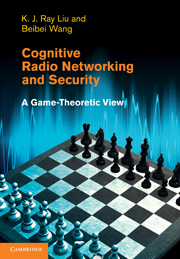Book contents
- Frontmatter
- Contents
- Preface
- Part I Cognitive radio communications and cooperation
- Part II Resource awareness and learning
- Part III Securing mechanism and strategies
- 15 Trust modeling and evaluation
- 16 Defense against routing disruptions
- 17 Defense against traffic-injection attacks
- 18 Stimulation of attack-resistant cooperation
- 19 Optimal strategies for stimulation of cooperation
- 20 Belief evaluation for cooperation enforcement
- 21 Defense against insider attacks
- 22 Secure cooperation stimulation under noise and imperfect monitoring
- References
- Index
18 - Stimulation of attack-resistant cooperation
from Part III - Securing mechanism and strategies
Published online by Cambridge University Press: 06 December 2010
- Frontmatter
- Contents
- Preface
- Part I Cognitive radio communications and cooperation
- Part II Resource awareness and learning
- Part III Securing mechanism and strategies
- 15 Trust modeling and evaluation
- 16 Defense against routing disruptions
- 17 Defense against traffic-injection attacks
- 18 Stimulation of attack-resistant cooperation
- 19 Optimal strategies for stimulation of cooperation
- 20 Belief evaluation for cooperation enforcement
- 21 Defense against insider attacks
- 22 Secure cooperation stimulation under noise and imperfect monitoring
- References
- Index
Summary
In autonomous ad hoc networks, nodes usually belong to different authorities and pursue different goals. In order to maximize their own performance, nodes in such networks tend to be selfish, and are not willing to forward packets for the benefit of other nodes. Meanwhile, some nodes might behave maliciously and try to disrupt the network and waste other nodes' resources. In this chapter, we present an attack-resilient cooperation-stimulation (ARCS) system for autonomous ad hoc networks to stimulate cooperation among selfish nodes and defend against malicious attacks. In the ARCS system, the damage that can be caused by malicious nodes can be bounded, cooperation among selfish nodes can be enforced, and fairness among nodes can also be achieved. Both theoretical analysis and simulation results are presented to demonstrate the effectiveness of the ARCS system. Another key property of the ARCS system is that it is completely self-organizing and fully distributed, and does not require any tamper-proof hardware or central management points.
Introduction
In emergency or military situations, nodes in an ad hoc network usually belong to the same authority and have a common goal. To maximize the overall system performance, nodes usually work in a fully cooperative way, and will unconditionally forward packets for each other. Emerging applications of ad hoc networks are now being envisioned also for civilian usage.
- Type
- Chapter
- Information
- Cognitive Radio Networking and SecurityA Game-Theoretic View, pp. 444 - 467Publisher: Cambridge University PressPrint publication year: 2010



